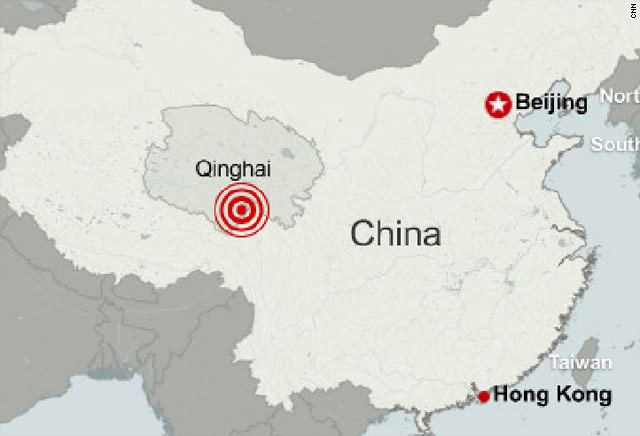Chinese premier visits quake zone as death toll climbs

- NEW: Premier Wen Jiabao traveled to China's earthquake-devastated zone Thursday night to inspect the damage
- Over 760 people dead, over 11,000 others injured in 6.9-magnitude quake
- Quake toppled 15,000 homes in and around Yushu, over 100,000 people fled the area
- Rescue effort hampered by unstable bridges and collapsed roadways
- Quake shook Qinghai province around 8 a.m. Wednesday
Jiegu, China (CNN) -- As rescuers raced against the clock to pull survivors from the rubble, Premier Wen Jiabao traveled to China's earthquake-devastated zone Thursday night to inspect the damage and assure victims that the search would continue.
"Your suffering is our suffering," Wen said. "We are going through the same pain as you are. The family members you lost are also our family members, and we grieve for them as you do."
Wen climbed over the rubble of buildings and spoke with residents in the predominantly ethnic Tibetan region.
"As long as there is a slight hope, we will never give up," he said. "We need to unite as one, to do a good job in our rescue work. At the same time, I assure everyone, that we will definitely make life good here again."
Both Wen and Chinese President Hu Jintao postponed planned foreign trips because of the disaster.
 Video: Rescue from the rubble
Video: Rescue from the rubble  Video: Search for survivors in China earthquake
Video: Search for survivors in China earthquake  Video: Earthquake devastates China
Video: Earthquake devastates China  Map: Earthquake in China
Map: Earthquake in China Wen postponed a scheduled visit to Brunei, Indonesia and Myanmar. Hu called the presidents of Chile and Venezuela to postpone his mid-April visits to those countries.
"During this difficult time, I need to be home as soon as possible together with our people providing relief," he said.
The death toll from Wednesday's 6.9-magnitude quake that struck the predominantly Tibetan prefecture of Yushu China's southern Qinghai province soared to 760 on Thursday, with more than 11,000 injured, state-run Xinhua news agency reported.
The powerful quake toppled about 15,000 homes in and around Yushu county, and caused more than 100,000 people to flee the area, said Zou Ming, director general of Disaster Relief Department of the Ministry of Civil Affairs.
In Jiegu, the town closest to the epicenter, people were taken to a sporting field serving as a makeshift hospital -- there are no hospitals in the town.
More than 85 percent of Jiegu's poorly constructed mud and brick houses collapsed. They were homes for ethnic Tibetans, among China's poorest people making a living as farmers and herdsmen.
Along the town's main street, all that was left of two hotels was a pile of rubble. Residents and monks used hand shovels and ropes to clear debris in hopes of reaching survivors.
Thursday's rescue effort was hampered by unstable bridges and collapsed roadways, making it difficult for heavy equipment to get to hard-hit areas, including Jiegu.
But after five hours of digging, rescuers were able to pull four survivors from a guest house in the area Thursday afternoon, state television reported.
Authorities have said more than 1,000 people were saved in similar rescues.
People: 44 ethnic groups, including Tibetans and Mongols
Average elevation: Over 3,000 meters above sea level
Geography: Qilian Mountains, the Qingnan Plateau and the source of the Yangtze, Mekong and Yellow Rivers
GDP: US$3.2 billion; average GDP per capita US$639
Industries: Agriculture, hydropower, oil and natural gas
Source: China Internet Information Center
CNN's John Vause, Licia Yee and Jo Ling Kent contributed to this report.

No comments:
Post a Comment